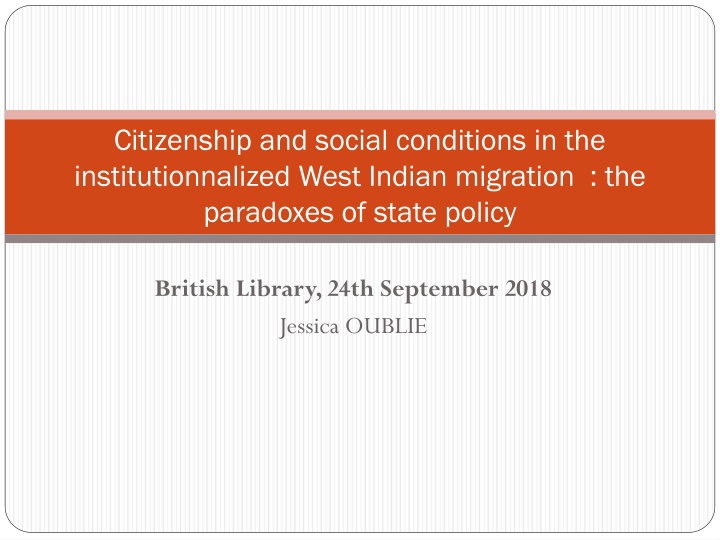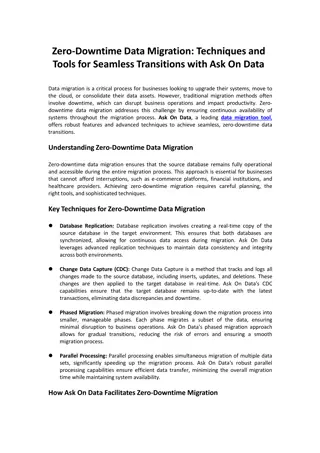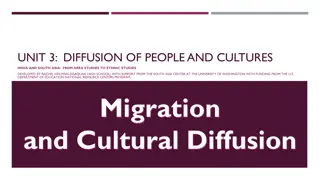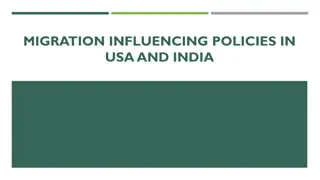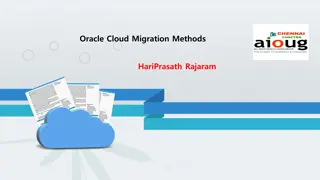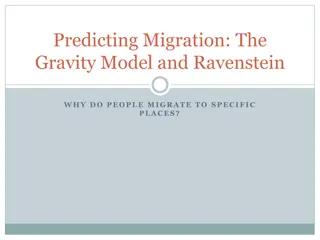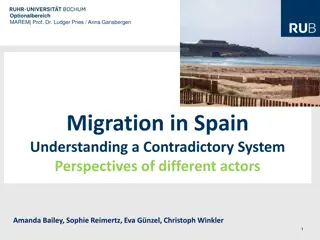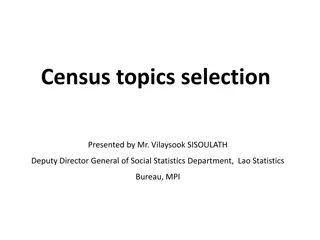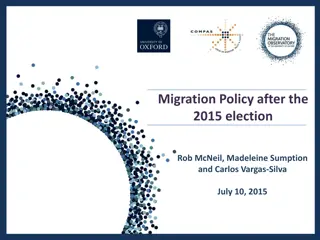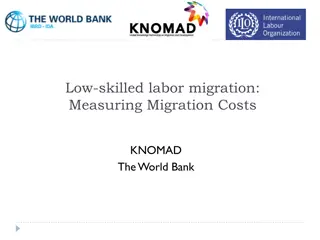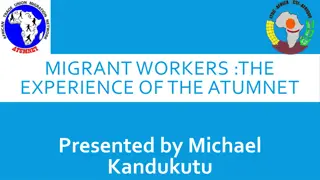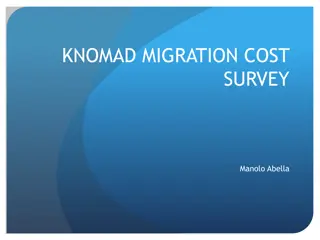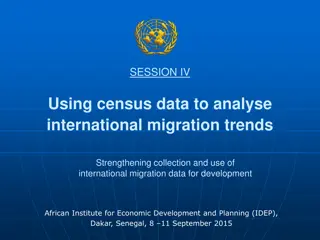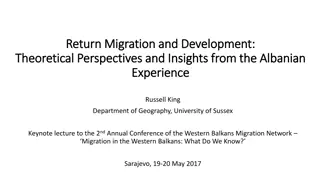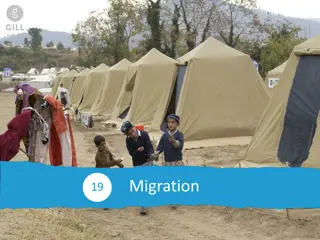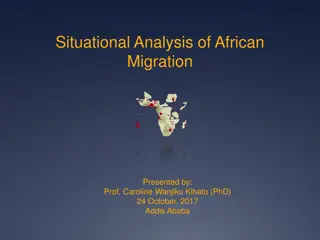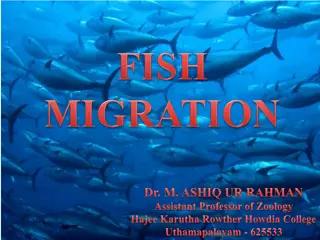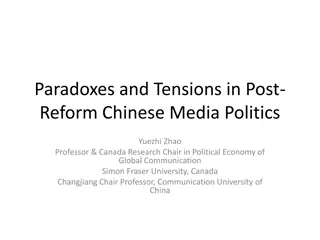Paradoxes of State Policy in West Indian Migration
The presentation discusses the creation of BUMIDOM in response to economic crisis and social movements in the French West Indies in the 1960s. It explores the ambiguous nature of migration, the social conditions of West Indian migrants in mainland France, and the lasting impact of BUMIDOM in the region today.
Download Presentation

Please find below an Image/Link to download the presentation.
The content on the website is provided AS IS for your information and personal use only. It may not be sold, licensed, or shared on other websites without obtaining consent from the author.If you encounter any issues during the download, it is possible that the publisher has removed the file from their server.
You are allowed to download the files provided on this website for personal or commercial use, subject to the condition that they are used lawfully. All files are the property of their respective owners.
The content on the website is provided AS IS for your information and personal use only. It may not be sold, licensed, or shared on other websites without obtaining consent from the author.
E N D
Presentation Transcript
Citizenship and social conditions in the institutionnalized West Indian migration : the paradoxes of state policy British Library, 24th September 2018 Jessica OUBLIE
Plan of the presentation 1 The rationale causes or reasons for BUMIDOM s creation 2 The ambiguous nature of this migration 3 The social conditions of West Indian migrants once in mailand France 4- the memory of BUMIDOM s in the French West Indies today.
1- The rationale or reasons for BUMIDOM s creation
A: An economic crisis : - Late 1950s: Banana production accounts for 80% of the French West Indian economy. - 1957: Opening of the European Common Market resulted in French West Indian bananas being put in competition with much cheaper African and Latin American bananas. - Early 1960s: Cane sugar was replaced by beet sugar produced in France much more cheaply. This is the end of a large number of sugar cane companies in Guadeloupe and Martinique. - B: Social and racial movements : - At the beginning of each year, the workers negotiate the revision of their daily wages with their employers. This usually leads to important social movements. For example : strike in Lamentin (Martinique) in 1948 (3 killed), at Lamentin (Martinique) in 1961 (3 killed), in Chalvet (Martinique) in 1974 (1 killed, several wounded)
C: Politicization of the conflict : - Castro revolution in Cuba, African countries independence, Algerian War, Vietnam War revive nationalist feelings and drive to protestations of autonomy and independence movements. D: BUMIDOM : - The Office for the Development of Migration from the Overseas Departments was created in 1963 in order to reduce the demographic surplus of the Overseas Departments as mentioned in Article 3 of its statutes. In 1960,Guadeloupe had about 250,000 people like Martinique and the French state deemed that these territories were overpopulated. The migration was seen by French authorities as the only possibility of development of the Overseas Departments.
2- The ambiguous concept of migration Bretons emigrate massively, well why not West Indians, who are also French provincials ? Extract from the daily newspaper France-Antilles, March 1968.
A : Franais Fran ais compl ment compl ment part (A. part (A. C saire) C saire) The French government ambiguously positions itself in relation to overseas immigration. On the one hand, it considers this emigration from a national point of view, to compare it with the Breton,Corsican andAuvergnat emigrations On the other hand, it contends that it includes some ethnic differences that are likely to raise the question of integration. Moreover, enquiries about moral behaviour are set up for each immigration applicant. Once in France, migrants are aided in their process of integration through : - Centres for adaptation in mainland France, - Fundings of cultural associations seen with an integrative role, - A policy of family reunification to assist spouses and children when they arrive. The National Office of Immigration takes the same actions to handle the foreign workforce.
While the State, with BUMIDOM, was committed to favour the social promotion of nationals from Oversea Departments : A : On a professional level: They were, like foreign migrant workers, recruited for the low-skilled jobs in private sector: domestic helpers, handlers, community workers, construction workers, in the automobile industry. They were also favoured to occupy low-skilled civil servant positions in hospitals or in the national Postal and Telecommunications company. Even those who arrived outside the BUMIDOM system were systematically directed to low-skilled jobs because of their geographical origin.
B:In terms of access to housing : On their arrival they were directed to community dwellings: La R union migrants hostel ( foyer in French) at Rue Monge, French West Indians and Guyanese migrants house at Boulevard Magenta. Some lived in hotels, where 4 people shared a room. They often faced problems finding accommodation from the government social housing institution (known as HLM in France) because they were considered to be already too numerous and noisy . C: On a social level: the installation in mainland France did not reserve the same fate to all migrants from overseas departments. Some bemoand the difficulty to find their space , the need to be discreet in order to be integrated, difficulties "to adapt to the different ways of life in mainland France . Some said they felt "embarrassed", "not to be considered French", They sometimes mentioned implicitly the discovery of racism. The militant and religious associations reported the presence in mainland France of French West Indians who became homeless and of women who were engaged in prostitution.
The promises of "eldorado" and the sun and moon " that often came up in interviews to describe the reasons for leaving, were replaced by "disappointment", "disillusionment", "treason", unease" when migrants were describing their social conditions once they arrived in France. Aim C saire had written about this subject: "Arrived in France, the West Indians discover that they are Negroes like the others". Indeed, migration raised the racial question. Overseas nationals, who had become French since 1848, discovered for the first time in mainland France that they were Black. The migratory shock was important on the side of the French people from mainland; they had considered that France is the Hexagon. They had had a very bad knowledge of its geopolitical and territorial diversity. In regard to the French West Indians, Guyanese and Reunionese, migration shock was all the more soul-destroying since they had learned at school that they were perfectly equal just like their Gallic counterparts, but they had to face the stark reality of humiliation even though they had previously felt perfectly assimilated.
4.Demographic consequences of migration on French West Indian islands
A : Decrease in population It is especially in the French West Indies that the effects of this policy on demography are spectacular. We are witnessing a real decrease in their population. In the last 5 years, Martinique has lost nearly 22,000 inhabitants. Conversely, the number of children born to West Indian parents and carried on living there continues to increase. In 2015, there were approximately 380,000 West Indians in mainland France, a total greater than the population of Martinique at the same date. Today, one in four French West Indians born in Guadeloupe or Martinique, one in seven born in Reunion island and one in eight born in French Guyana live in mainland France. In less than 60 years, natives of Overseas Departments and their children are approximately 640,000 people, which could represent a sixth Overseas Department.
B: Accelerated ageing In the French West Indies, one of the visible consequences of migration is the accelerated ageing of the population. While Martinique and Guadeloupe had 60% of people under 20 in 1960, in 2030, these territories will be the two oldest departments in France. People aged 60 and over will exceed 40% of the population. Moreover, the decrease in the birth rate, from 6 children per woman in 1960 to 1.9 today, has been progressively dramatic, and the age pyramid continues to narrow.
C: Disintegration of intergenerational solidarity Today, one third of people aged 65 to 79 living in the French West Indies no longer have any children onsite who can help them if a problem occurs. In addition, many live below the poverty line because many of them had sporadic and underpaid jobs. Finally, the question of return seems a much less attractive prospect than for the first migrants. 4 in a 100 persons born in the West Indies who receives a retirement pension, lives in mainland France. There are several reasons: children and grandchildren live in mainland France, the very high cost of living in the overseas departments, it is difficult to move without a car and the health care access is less easy. And over the years, distrust has developed between those who remained "at home" and those who and became "n gropolitains (Blacks born and raised in mainland France).
A : Traumatic memories : BUMIDOM a taboo for many people ? First, because we knew that BUMIDOM prioritised the departure of the poorest, the less educated persons, with a low social level. Then, because their departure was seen as a new form of deportation by several political organisations and trade unions. Lastly, because the jobs kept for these migrants were very often not connected with the job they applied for. Nevertheless, this story was not a taboo for all these migrants. For some of them instead, BUMIDOM was a resource, a successful experience that fully met their expectations of their social and professional project.
B: A story under construction Nowadays, the migratory policy of BUMIDOM is not unknown anymore by French citizens. - Le r ve fran ais ( The French Dream ), produced by National television channels France 2 and France O and broadcast in June 2018. - The Museum of the History of Immigration currently working on the exhibition Paris-Londres for 2019 who present Caribbean contemporary migration in Europe. - Dissertations and doctoral theses are regulary written in France and in the West Indies about migration and mobility.
C- Archives, traces and memory To write P yi an nou, we have used different sources : The records of the administration and of the ministries of Overseas Territories, of Labour, and of Housing. The personal records of the migrants. About 15,000 are available after requesting clearance to consult them. The autobiographical interviews. It is easier now, after P yi an nou and Le r ve fran ais to meet people who agree to testify, to remove anonymity, to put into words by themselves on the dark pages of their history, of our history.
A: Moving from a migration policy to a mobility policy Bumidom no longer exists but since 2010, another agency has replaced it: Ladom (the Agency for the mobility of the overseas departments). It provides them (migrants) with assistance in moving, setting up and placing them on internships or apprenticeships in fields such as tourism, banking, insurance, transport and medico-social. The transition from a migration policy to a mobility policy indicates the state's desire to limit mass emigration by responding to key requests from the territories. Nevertheless, although we know that 3,000 to 4,000 young people leave Martinique and Guadeloupe each year with Ladom to go to mainland France, the agency does not know how many of them return after their training. Consequences: today, young people are more likely to leave than at the time of Bumidom.
B: What perspectives for young people today? The ageing population of the overseas departments offers significant employment opportunities in personal assistance, quality, real estate, design and so on. Everything remains to be done. However, the young people can not only work as servants for their elders in overseas departments. Other job opportunities need to be developed. This is why a system of assistance to the "return" to the homeland has been set up by the Martinique Region. This is why the Guadeloupe Region has signed an agreement to connect businesses and young graduates wishing to return. Therefore, regional integration of companies in the Caribbean Basin, in the Indo-Oceanic region, and in South America is essential to secure the professional prospects of young people who, in part, would like to be able to live and work in their homeland.
